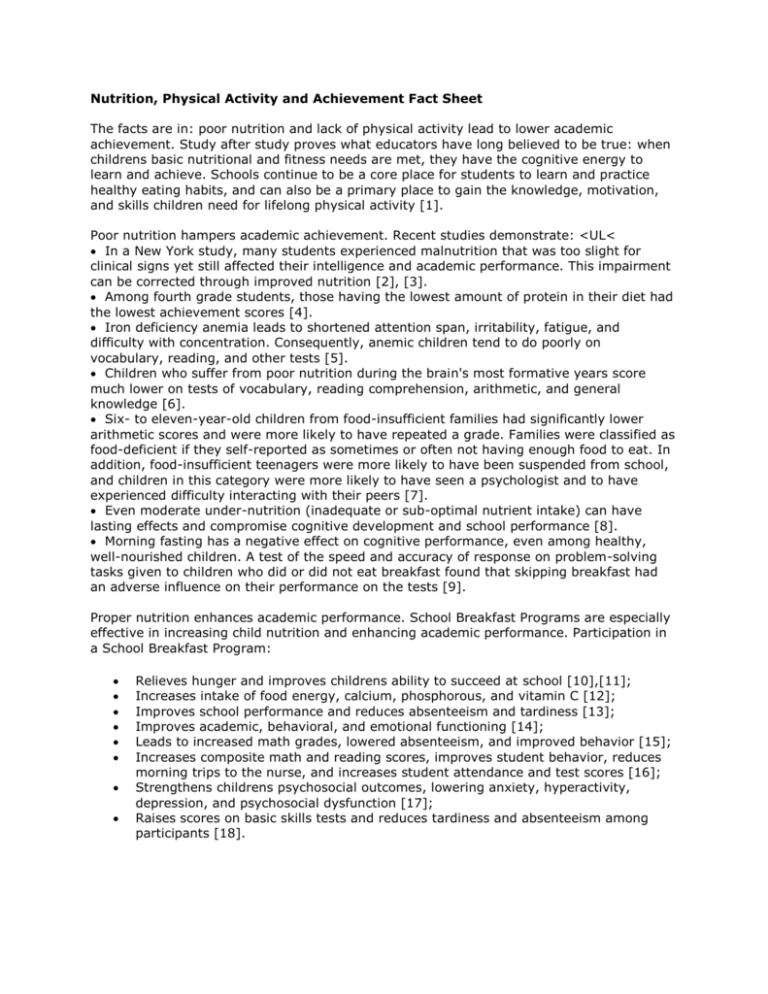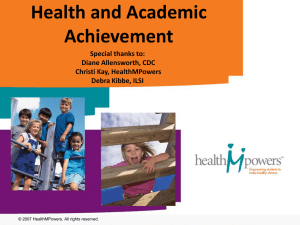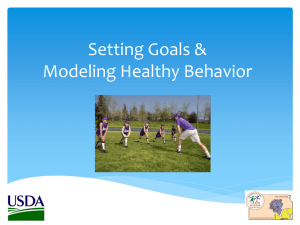Nutrition and Achievement - Pembina Trails School Division
advertisement

Nutrition, Physical Activity and Achievement Fact Sheet The facts are in: poor nutrition and lack of physical activity lead to lower academic achievement. Study after study proves what educators have long believed to be true: when childrens basic nutritional and fitness needs are met, they have the cognitive energy to learn and achieve. Schools continue to be a core place for students to learn and practice healthy eating habits, and can also be a primary place to gain the knowledge, motivation, and skills children need for lifelong physical activity [1]. Poor nutrition hampers academic achievement. Recent studies demonstrate: <UL< In a New York study, many students experienced malnutrition that was too slight for clinical signs yet still affected their intelligence and academic performance. This impairment can be corrected through improved nutrition [2], [3]. Among fourth grade students, those having the lowest amount of protein in their diet had the lowest achievement scores [4]. Iron deficiency anemia leads to shortened attention span, irritability, fatigue, and difficulty with concentration. Consequently, anemic children tend to do poorly on vocabulary, reading, and other tests [5]. Children who suffer from poor nutrition during the brain's most formative years score much lower on tests of vocabulary, reading comprehension, arithmetic, and general knowledge [6]. Six- to eleven-year-old children from food-insufficient families had significantly lower arithmetic scores and were more likely to have repeated a grade. Families were classified as food-deficient if they self-reported as sometimes or often not having enough food to eat. In addition, food-insufficient teenagers were more likely to have been suspended from school, and children in this category were more likely to have seen a psychologist and to have experienced difficulty interacting with their peers [7]. Even moderate under-nutrition (inadequate or sub-optimal nutrient intake) can have lasting effects and compromise cognitive development and school performance [8]. Morning fasting has a negative effect on cognitive performance, even among healthy, well-nourished children. A test of the speed and accuracy of response on problem-solving tasks given to children who did or did not eat breakfast found that skipping breakfast had an adverse influence on their performance on the tests [9]. Proper nutrition enhances academic performance. School Breakfast Programs are especially effective in increasing child nutrition and enhancing academic performance. Participation in a School Breakfast Program: Relieves hunger and improves childrens ability to succeed at school [10],[11]; Increases intake of food energy, calcium, phosphorous, and vitamin C [12]; Improves school performance and reduces absenteeism and tardiness [13]; Improves academic, behavioral, and emotional functioning [14]; Leads to increased math grades, lowered absenteeism, and improved behavior [15]; Increases composite math and reading scores, improves student behavior, reduces morning trips to the nurse, and increases student attendance and test scores [16]; Strengthens childrens psychosocial outcomes, lowering anxiety, hyperactivity, depression, and psychosocial dysfunction [17]; Raises scores on basic skills tests and reduces tardiness and absenteeism among participants [18]. Across the nation, physical education programs are on the decline. From 1991 to 1999, the percentage of students who attended daily physical education classes declined from 42% to 29% [19]. The majority of high school students take physical education for only one year between 9th and 12th grades [20]. Increased physical activity leads to higher academic achievement. Recent studies show: Providing more opportunity for increased physical activity (by reducing class time) leads to increased test scores. A reduction of 240 minutes per week in class time for academics to enable increased physical activity led to consistently higher mathematics scores [21], [22]. Intense physical activity programs have positive effects on academic achievement, including increased concentration; improved mathematics, reading, and writing test scores; and reduced disruptive behavior. Academic achievement improves even when the physical education reduces the time for academics [23]. Aerobic conditioning may help to improve memory. Exercise may strengthen particular areas of the brain, and oxygen intake during exercise may enhance greater connections between neurons [24]. Sources: [1] Bogden, J.F. Fit, healthy, and ready to learn: a school health policy guide. Alexandria (VA): NASBE, 2000; [2] Schoenthaler, S. Abstracts of early papers on the effects of vitamin-mineral supplementation on IQ and behavior. Personality and Individual Differences 1991;12(4):343; [3] Schoenthaler, S., Amos, S., Eysenck, H., Peritz, E., and Yudkin, J. Controlled trial of vitamin mineral supplementation: effects on intelligence and performance. Personality and Individual Differences 1991;12(4):361; [4] American School Food Service Association (ASFSA). Impact of hunger and malnutrition on student achievement. School Board Food Service Research Review 1989;(1,Spring):17-21; [5] Parker, L. The relationship between nutrition and learning: a school employee's guide to information and action. Washington: National Education Association, 1989; [6] Brown, L., Pollitt, E. Malnutrition, poverty and intellectual development. Scientific American 1996;274(2):38-43; [7] Alaimo, K., Olson, C.M., Frongillo Jr., E.A. Food insufficiency and American school-aged children's cognitive, academic, and psychosocial development. Pediatrics July 2001;108(1):44-53; [8] Center on Hunger, Poverty, and Nutrition Policy. Statement on the Link between Nutrition and Cognitive Development in Children. Medford, MA: Tufts University School of Nutrition 1995; [9] Pollitt, E., Leibel, R., Greenfield, D. Brief fasting, stress, and cognition in children. American Journal of Clinical Nutrition 1991;34(Aug):1526-1533; [10] Murphy, J.M., Pagano, M.E., Nachmani, J., Sperling, P., Kane, S., Kleinman, R.E. The relationship of school breakfast to psychosocial and academic functioning. Archives of Pediatrics and Adolescent Medicine 1998;152:899-906; [11] Kleinman, R.E. et al., Hunger in children in the United States: potential behavioral and emotional correlates. Pediatrics 1998;101(1):E3. [12] Mathematica Policy Research. Childrens diets in the mid-1990s: dietary intake and its relationship with school meal participation. Final report to USDA 2001; [13] Office of Research, Education, and the Center for Nutrition Policy and Promotion, USDA. American Journal of Clinical Nutrition 1998;67(4):798S-803S; [14] U.S. Department of Health and Human Services. Guidelines for school health programs to promote lifelong healthy eating. Morbidity and Mortality Weekly Report Recommendations and Report 1996 Jun 14; 45:RR-9; [15] Barnard, A. Study links school breakfast, results. Boston Globe 2000 Nov 29; [16] Minnesota Department of Children Families and Learning. School breakfast programs energizing the classroom 1998; [17] Murphy, J.M. et al. Effects of a universally free, in-classroom school breakfast program: results from the Maryland Meals for Achievement Evaluation. Initial Report 1999 May 4; [18] Meyers, A.F. et al. School breakfast program and school performance. American Journal of Diseases of Children 1989;143:12349; [19] Centers for Disease Control. Physical activity and good nutrition: essential elements to prevent chronic diseases and obesity. At a Glance 2002; [20] NASPE, Executive Summary, Shape of the Nation 2001; [21] Shephard, R.J., Volle, M., Lavalee, M., LaBarre, R., Jequier, J.C., Rajic, M. Required physical activity and academic grades: a controlled longitudinal study. In: Limarinen and Valimaki, editors. Children and Sport. Berlin: Springer Verlag; 1984. 58-63; [22] Shephard, R.J. Curricular physical activity and academic performance. Pediatric Exercise Science 1997;9:113-126; [23] Symons,C.W., Cinelli, B., James, T.C., Groff, P. Bridging student health risks and academic achievement through comprehensive school health programs. Journal of School Health 1997;67(6):220-227 ; [24] Jensen 1998








